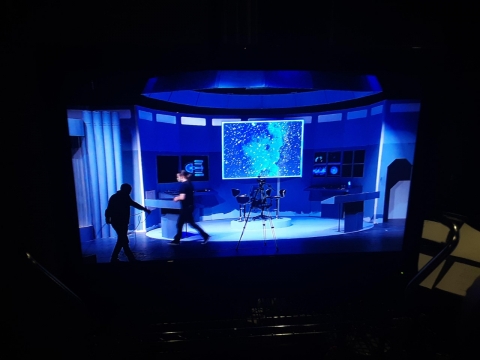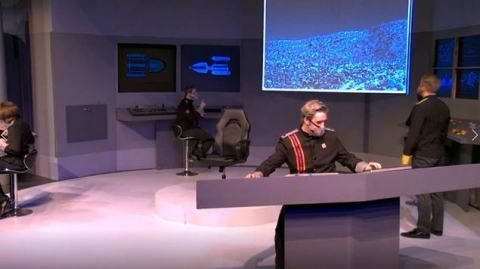
Livestream technology and new equipment secured through the CARES Acthas helped University System of New Hampshire (USNH) institutions keep their performing arts programs thriving during COVID-19. Campuses have turned their mainstage theaters into makeshift television studios, providing students and faculty with new opportunities to deliver music, dance and theatre to audiences.
Enterprise Technology & Services helped make the livestream broadcasts possible by providing consultation on the system design and livestream equipment, technical support for Zoom videoconferencing and high-speed networks.
At Plymouth State University (PSU), faculty and students have transformed the Silver Center for the Arts into a space where they can livestream. Students gain practical experience as camera operators and video production staff while remaining safely distanced.
“Thanks to this equipment, we have established our mainstage theatre as a television studio,” said Matt Kizer, a design professor in the theatre department. “The students are learning to produce performances with entirely new models as we engage with the television model and the screen instead of the live-performance model. This project is easily among the more memorable work we have undertaken.”
This fall Kizer has overseen productions of a choral version of “Sister Act”and an episodic science-fiction series called “SilverStar Voyages,”where students are playwriting and producing each episode.
Stuart Crowell, director of cultural arts center and a teaching lecturer for the PSU theater department, said that along with livestreaming, theatre and dance departments can also record shows for review and post-performance critiquing by teachers, advisors and students.
“This project has had a big effect on the programs,” he said. “Going forward we expect this to be the new norm in the post-pandemic future too.”
At the Redfern Theater at Keene State College, Technical Director Alex Trombly said the new equipment has allowed the theater to continue providing student performance experiences while also reaching an expanded audience beyond campus.
“Without the equipment, the performances would be very limited,” Trombly said.
At the University of New Hampshire, the music and theatre departments have livestreamed 14 events to YouTube and have another 16 on the calendar, including student and faculty recitals, band and orchestra concerts, and vocal performances.
Adam Gallant is equipment manager, music librarian and assistant outreach coordinator at the Paul Creative Arts Center.
“The new livestreaming equipment has been incredibly valuable to the music department,” Gallant said, adding that with the new gear, the broadcasts are better by leaps and bounds. “It is by far more intuitive, and result is vastly superior high-definition video and audio product. This ability has been crucial for us to give meaningful performances, and it has also helped us meet some of our recruiting goals.”
Robert Henry, manager of theatre operations at the UNH Johnson Theatre and Bratton Recital Hall, said the initial responses to the virtual performances have been positive.
“This has been fantastic for theatre in getting our programs to the public,” he said. “This system will also give us high-quality recordings for archive, and experience for our students in video production. Going forward I am sure there are potential uses we haven't thought of yet.”




